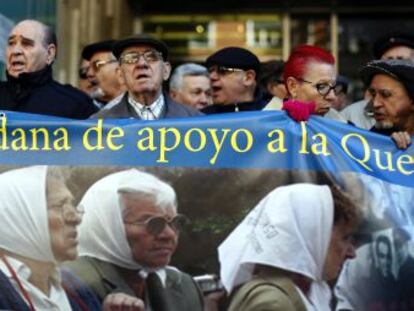Rights lawyers demand arrest of four ex-Franco officials wanted in Argentina
Victims celebrate decision, although government unlikely to order detention of men Associations say they are seeking justice in Argentina after being unable to find it in Spain
Lawyers for the families of victims of the Francisco Franco regime said Thursday they will pressure the Spanish government to arrest four men who are wanted in Argentina after a Buenos Aires judge issued international warrants as part of her investigation into crimes committed during Spain’s dictatorship.
“The government is obligated to carry out the arrests under international treaties,” said Ana Messuti, one of the lawyers working on the prosecution of past Franco officials, during a press conference in Madrid. “The government will not be in a good position if it refuses.”
In an unprecedented ruling, Argentinean Judge María Servini de Cubría late Wednesday ordered international arrest warrants for the four Spaniards. They are accused of torture and abuses during the later years of the Franco dictatorship, which ruled from 1939 to 1975.
Servini’s decision to investigate these former mid-level officials is being hailed as a major victory for the victims of the Franco regime, which .
The government is obligated to carry out the arrests under international treaties"
Servini found probable cause to charge the four, who all live in Madrid, based on the doctrine of universal justice. Around 170 people and several associations representing victims had filed a suit with the Buenos Aires court on April 14, 2010 against the crimes committed during the Franco period after being unable, they claimed, to seek justice in Spain.
Wednesday’s arrest warrants are the first to be issued by Servini since she started her investigation three years ago. She has requested the extradition of former Civil Guard officer Jesús Muñecas Aguilar; Franco’s ex-bodyguard Celso Galván Abascal; former police commissioner José Ignacio Giralte González; and former police inspector José Antonio González Pacheco, who was known as “Billy the Kid.”
It is unlikely that the conservative government of Prime Minister Mariano Rajoy will follow through with the arrests. Some months ago, government officials used their influence to ensure the cancelation of a videoconference in Madrid, where witnesses were scheduled to provide testimony on camera to Judge Servini and prosecutors in Buenos Aires, according to lawyers representing the victims and their families. But the four wanted suspects may not be able to leave the country without running the risk of capture by Interpol.
Galván, 78, is accused of torturing José María Galante Serrano in 1969 after he was arrested for “subversive activities.” His case was never taken to court. Franco’s former bodyguard is also suspected of torturing Acacio Puig Mediavilla, who was arrested in 1973 and was taken to National Security headquarters, where he was beaten.
Muñecas, 74, is accused of torturing Andoni Arrizabalada Basterrechea in 1968. “This is what happens to those who don’t want to cooperate,” Muñecas reportedly said at the time, according to a witness who saw a bloody Arrizabalada in the Civil Guard headquarters in Zarautz, Gipuzkoa. The man’s face had been beaten and his arms were covered with bruises, the witness told the court.
Giralte, 72, who lives in the Tres Cantos suburb of Madrid, is also being investigated for the torture of Galante and another man, Alfredo Rodríguez Bonilla. “[Giralte and Jesus González Regiero, another officer] told me to lower my head. Each time I did that, they would beat me,” Rodríguez Bonilla testified. “I was beaten on my back, with the same chains that they put me in when I was arrested. They would also kick me in my crotch.
“Each time they would hit me they would say, ‘Tells us that your mother is a whore and your father is a faggot’,” he recalled.
González Pacheco, alias “Billy the kid,” is now 66 and also resides in Madrid. He is charged with torturing 13 people, who still remember his coldness when he would dole out sharp blows with his club, and the excuse he gave as to why he was beating them: he didn’t like their faces.
Tu suscripción se está usando en otro dispositivo
¿Quieres añadir otro usuario a tu suscripción?
Si continúas leyendo en este dispositivo, no se podrá leer en el otro.
FlechaTu suscripción se está usando en otro dispositivo y solo puedes acceder a EL PAÍS desde un dispositivo a la vez.
Si quieres compartir tu cuenta, cambia tu suscripción a la modalidad Premium, así podrás añadir otro usuario. Cada uno accederá con su propia cuenta de email, lo que os permitirá personalizar vuestra experiencia en EL PAÍS.
En el caso de no saber quién está usando tu cuenta, te recomendamos cambiar tu contraseña aquí.
Si decides continuar compartiendo tu cuenta, este mensaje se mostrará en tu dispositivo y en el de la otra persona que está usando tu cuenta de forma indefinida, afectando a tu experiencia de lectura. Puedes consultar aquí los términos y condiciones de la suscripción digital.









































